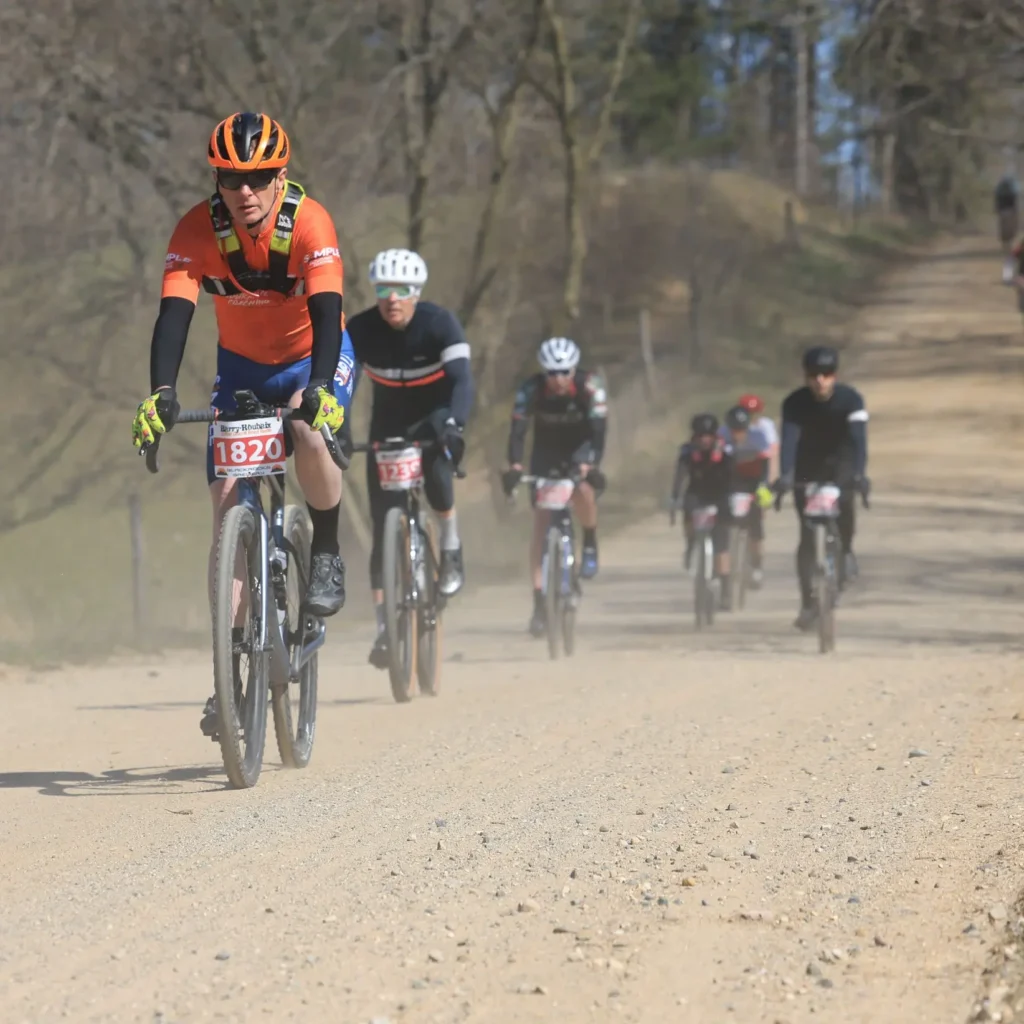One of my coaching athletes has been training for a big challenge, and as the event nears, we’ve been focusing a lot on her mental skill training, especially finding joy in the process of training.
What I mean by that is enjoying the training and competition just for the challenge, not as a measure of our value as people.
For most of my life, I have worked on my own mental skill training, with varying degrees of success.
As everyday endurance athletes, our mental skills – not necessarily mental health – play a huge role in our training and competition.
And I don’t mean whether we win or lose – that’s really irrelevant.
Doing mental skill training during long hours of endurance sport practice gives us a unique opportunity to bring more joy into our lives.

Professional tennis player looks for joy, finds victory
Iga Swiatek, the Polish tennis player who has won the French Open, has a mental health coach, Daria Abramowicz.
The coach advocates for finding hobbies, building relationships, and having a good life, in addition to training.
In a Sportsletter column called The Underdog, I read about how Swiatek focuses her training on mental health.
Her coach told the New York Times, “It is impossible to become a champion when you don’t have a fundamental joy and your needs fulfilled and satisfied as a human being.”
In another great resource, the Cycling Performance Club podcast interviewed Shannon Malseed, a former Australian pro cyclist who now works with athletes on mental health and mental skills.
Mental skills training for endurance athletes
On a long ride or run, there’s a lot of time to think.
While mental skill training is important for all athletes, endurance athletes have a huge challenge: time.
I can go out for a ride and think for many hours – and, more importantly, the thoughts in the back of my skull can come at me for hours.
Here’s what I mean: many (maybe all) of us, including my coaching athlete and myself – get bombarded by messages while we train.
And often these messages are negative: “You’re not good enough,” “You’ll never measure up,” and “Why are you doing this if you can’t win.”
I’m not going into where these messages come from; we’ll just talk about what to do with them.
This means a “paradigm shift” in mental skills training
I used to teach middle school kids, and I remember one bubbly girl who would wish people luck by doing a pirate voice and saying “argh” while giving us an enthusiastic thumbs up.
Thinking of the “argh” was one way I tried to change my mental energy during races.
And changing the mental focus is called a “paradigm shift,” or a change in the structure of how we think.
Our brains are powerful. I teach a lot about growth mindset, which is the idea that our brains can actually grow and develop new pathways.
A growth mindset means we can change how we think.
It’s not easy, and it’s not quick, but the change in our mental skill training can be done.
Reframe your thinking with mental skill training
There are a lot of ways to do mental skill training.
I used two books: The New Toughness Training for Sports by James E. Loehr and Mental Training for Peak Performance by Steven Ungerleider.
In addition, I’ve done lots of therapy and talked with others about these skills because, let me tell you, they’re a challenge to do, and they require a lot of practice!
We’ll look at just two ways to reframe your thinking that came up during my talk with my coaching client.
Mental Skill Training Tool #1: Set good process goals and outcome goals
For everyday athletes, finishing a challenge event is usually a great goal.
But sometimes outcome goals like finishing in the top ten or beating a certain time creep in.
And, honestly, sometimes a results goal can be a good thing to motivate certain people.
For me, though, that kind of goal made me crazy before and after the event because once I set that goal, I was doomed to failure because my brain derailed my thinking.
So a goal of finishing an event is great. So is finishing under a certain time frame. And so is finishing with a smile on my face and thinking that I could have done more!
You can reframe an outcome goal (what are the results) to reflect simply having fun with a challenging goal.
Similarly, your process goals (how you’re going to reach the outcome) can reflect different goals as well.
You can focus on the daily challenge, seeing improvement each day, and seeing how the training is affecting your determination, motivation, and patience in regular life.
Mental Skill Training Tool #2: Self-talk affects your mental and emotional state
How we talk to ourselves is often the key element of mental skill training.
Essentially, you can talk to yourself in positive ways (“You got this,” “You’re doing well”) or negative ways (“You’re a dumbass,” “You’ll never be able to finish this”), and sometimes both!
Negative self-talk is a joy killer. There’s no way I can have fun and experience the joy of endurance sports if I feel like I’m a failure or a dumbass.
This means consciously replacing negative messages with positive ones.
I have written positive messages on notecards and said them to myself every day.
And positive self-talk can create joy. I don’t mean fluffy exuberance, either.
We undertake endurance challenges for the love and excitement of the challenge.
We don’t try to run a marathon or ride a century to punish ourselves, although I’m sure that happens.
Here is a way to work on replacing negative self-talk (pp. 98-99).
Training gives you a chance to practice mental skills training
One way to immediately change the paradigm is by treating every workout, ride, and run as an opportunity for growth.
Try it.
Every time you go out for a run, ride, yoga class, or gym workout, pick one negative message you tell yourself and replace it with a positive one.
Every time you hear the voice in your head saying you’re slow, remind the voice that you’re moving as fast as you can today, or whatever you’ve decided to tell yourself.
My voices are all that I “should” be able to do if asthma wasn’t an issue.
My response is “I’m riding my bike today when doctors told me it would never happen.” And “I’m feeling faster than I did last year.”
My favorite, though, is reminding myself that I get better-looking every day!
Breath practice in yoga is great mental skill training
Every coaching client of mine gets a big dose of yoga practice, for strength and mobility, but also for breath practice.
Learning to control your breathing – breathing into your belly, in and out through your nose – is practice for when the negative messages come at you fast and furious.
I may not be able to breathe through my nose during a race or hard workout, but I can still work to control my breathing.
And that control practice reminds me to find my positive words.
Mental skills training requires practice – a lot of practice
I’ve never been very successful with this practice.
I’ve been a bit of a “head case” since I was playing tennis back in high school.
My brain seems to automatically go to a place where success in races means validation as a person.
As I age, it gets better, and I admit that practicing this stuff is really hard sometimes.
The negative self-talk rut in my mind is pretty well-worn.
But I remember the kid’s pirate “argh,” and I remember to smile.
Sometimes I have to remind myself to have fun, and that the challenge of endurance events is to see what you’ve got inside. Many times what’s inside is a mess!
But the practice makes a difference.
You are able to change the tune in your brain. And changing the tune with mental skills training makes all the difference between a great time tackling the challenges you’ve chosen to face, and a miserable time when everything just sucks.
It’s a daily practice.
Three things cyclists and runners can consider about mental skills
- Set process goals, not outcome goals, to help you find more satisfaction with the training.
- Change your self-talk to be more supportive and encouraging.
- Practice self-talk and breathing on your training days.
Need more?
Unlock the secrets to mastering gravel racing with our FREE Guide to Gravel Racing! Get yours here.
BOOK A CALL so we can discuss your goals, answer questions, and talk about making your endurance training more effective, fun, and Simple.
Paul Warloski is a:
- USA Cycling Level 1 Advanced Certified Coach
- RRCA Running Coach
- Training Peaks Level 2 Coach
- RYT-200 Yoga Instructor
- Certified Personal Trainer
- Certified Nutrition Advisor




